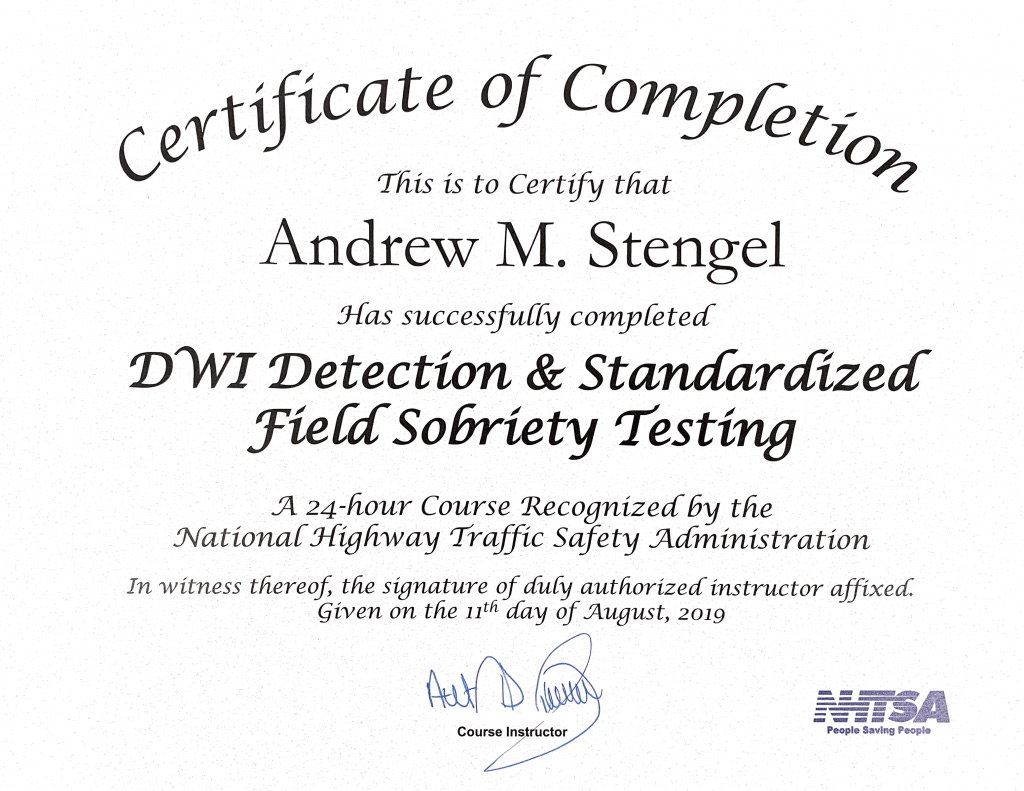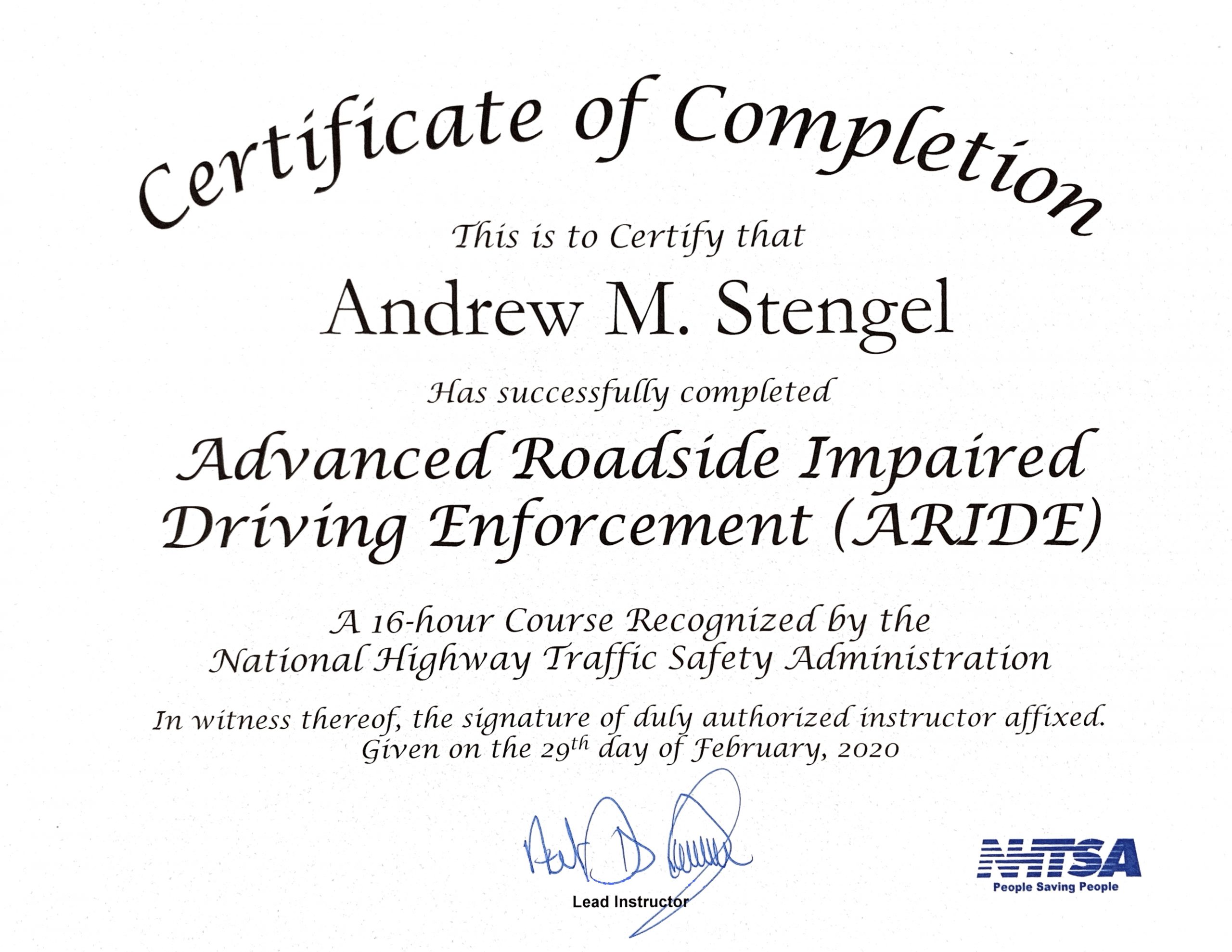New York DWAI by Drugs Attorney
For most people, “DWI” brings drunk driving to mind. While it is true that most Driving While Intoxicated charges relate to alcohol, it is also a crime to drive after consuming drugs or a controlled substance. In New York, this crime is called Driving While Ability Impaired by Drugs or “DWAI by Drugs,” Vehicle and Traffic Law Section 1192(4). The impairment may be attributable to the use of a single drug, or a combination of drugs, alcohol and/or controlled substances. Retaining an experienced DWI by Drugs lawyer in NYC early on is essential in reaching a favorable outcome.
One important factor when hiring a DWI or DWI Drugs lawyer is the special training the lawyer may have. Police receive specialized training for DWIs including Standardized Filed Sobriety Tests (SFSTs) and Advanced Roadside Impaired Driving Enforcement (ARIDE). The best DWI and DWI Drugs lawyers in New York also have this training.

Andrew M. Stengel is trained the same way as police to perform DWI Standardized Field Sobriety Tests.
Driving Under the Influence of Prescription Drugs
In New York, authorization to use a drug or controlled substance is not a defense to DWAI by Drugs. For example, a person who has a valid prescription for opiates may legally take those drugs, but is still prohibited from driving while impaired by the use of those drugs. So, a person having taken the legally prescribed dose of a legal drug may still be convicted of DWAI by Drugs.

NYC DWI and DWI Drugs Advanced Roadside Impaired Enforcement (ARIDE) Certificate
The District Attorney’s Burden of Proof in DWAI by Drugs Cases
As in any criminal case, the District Attorney (DA) has the burden of proving each element of the DWAI by Drugs beyond a reasonable doubt. That is a high standard, and it is often all the more difficult to meet in a drug-related driving while impaired case.
DWAI by Combined Influence of Alcohol and Drugs
It is also possible to be charged for DWAI by the combination of alcohol and drugs. Vehicle and Traffic Law Section 1192(4-a) states: “No person shall operate a motor vehicle while the person’s ability to operate such motor vehicle is impaired by the combined influence of drugs or of alcohol and any drug or drugs.”
Prosecutorial Challenges in DWAI by Drugs Cases
When a driver is suspected of driving under the influence of alcohol, there may be clear signs and measures that are applied in most cases. But, there is no handy roadside device to measure the presence of opiates in your system, or to determine the extent to which you might be under the influence of marijuana like a breathalyzer does with alcohol.
In some cases, the evidence of impairment by drugs may be a driver’s own admissions to the police about consuming a drug. In other cases, police may find marijuana or a controlled substance on the person who is arrested or in the car. In still other cases, the evidence of DWAI by Drugs may be from a blood test.
However, a driver may refuse to submit to a blood test, just as he or she could refuse a breathalyzer test. Like breathalyzer test refusal, refusal to submit to a blood test will result in an automatic suspension of one’s license. Even if a driver does submit to a blood test and the test shows levels of marijuana or a drug, a skilled defense attorney may attack the blood test results.
Likewise, the police generally will not be greeted by the odor of your prescription medication when you roll down the window to hand over your driver’s license and insurance card. Of course, marijuana may be a different story.
None of this means that it is safe to drive under the influence of drugs—legally or in human terms. Driving While Ability Impaired by Drugs is a crime for a reason, and getting behind the wheel under the influence puts you at risk of harming yourself or others.
In addition, drug-related DWAI charges are generally harder to prove than alcohol-related charges, but it’s not impossible. People are convicted of DWAI by Drugs, and the penalties are serious.
Penalties for DWAI by Drugs
The potential penalty for a first offense DWAI by Drugs is the same as that for a first offense DWI charge involving alcohol:
- Up to 1 year in jail;
- A fine of between $500 and $1,000; and
- A 6-month driver’s license suspension
Like other DWI-related charges, DWAI by Drugs carries more serious penalties for subsequent convictions. A second conviction within 10 years is a Class E felony, carrying a potential penalty of:
- Up to 4 years in prison;
- A fine of $1,000 to $5,000; and
- Driver’s license revocation of at least 1 year
A third offense in ten years will be charged as a Class D felony, which may mean:
- Up to 7 years in prison;
- A fine of $2,000 to $10,000; and
- Driver’s license revocation of at least 1 year
Other fees and costs also apply to these convictions.
Mixing and Matching DWI Convictions
For purposes of classifying a DWAI by Drugs offense as a second or third offense within a 10-year periods and pursuing felony charges, the previous conviction need not have been identical to the current charges. For example, a conviction during the past 10 for driving under the influence of alcohol will support the charging of DWAI by Drugs as a Class E felony.
DWAI by Drugs after an Aggravated DWI Conviction
A driver with a prior Aggravated DWI conviction will face a minimum 18-month driver’s license revocation when convicted of DWAI by Drugs, just as he or she would if convicted of DWI.
Indirect Consequences of a DWAI by Drugs Conviction
Like DWI charges associated with alcohol, a conviction based on the use of drugs or controlled substances, or a combination of drugs and alcohol, will have a serious impact beyond the direct penalties imposed by the court.
For example, a DWAI by Drugs conviction can interfere with your eligibility for certain types of employment or licensing.


